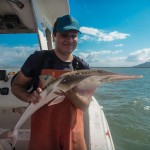
David Moreno
Shark Ecologist
Institute for Marine and Antarctic Studies
I have always been curious. Since quite young I realized that the more I understood about how things work, the more I could enjoy them. One visit to the Natural History Museum back home in Mexico City and I was hooked; I knew I wanted to be a scientist.
I was specially fixated with dinosaurs and marine life. When the time to go to University came, I decided to do a degree in Marine Science. I learned a lot during my degree, not only about the incredible importance of marine systems and the threats they face, but also about my role as a scientist in the conservation process.
During this period I was lucky to get to work in projects in Australia, Mexico and the Galapagos Islands. This experience made me particularly interested in sharks and their relatives. They are prehistoric in origin, have awesome teeth, are of great importance for marine ecosystems and are very cool. However, remarkably little is known about many species, some of which are now threatened or vulnerable. I was particularly drawn to the way humans interact with them in fisheries and how those interactions change between developing and developed nations.
Since then, I have begun my own research through an honours degree and currently a PhD. My work has broadly focused on using modelling techniques to better manage poorly understood sharks species. My current PhD has expanded on this to include animal movement, reproductive biology, life histories and new techniques to create a more complete picture of a species. I am doing this for a special population of sharks of the West coast of Tasmania, where I have been lucky to work for the past two years. I hope that by increasing our understanding of their biology we can better manage these amazing species and protect them to ensure their continued permanence.
Science has allowed me to travel around the world, meet very interesting people and satisfy my natural curiosity. It has also given me skills like scuba diving, animal handling, use of specialized equipment and even data analysis. But above all else, a career in science has allowed me to do what I like most for a living.